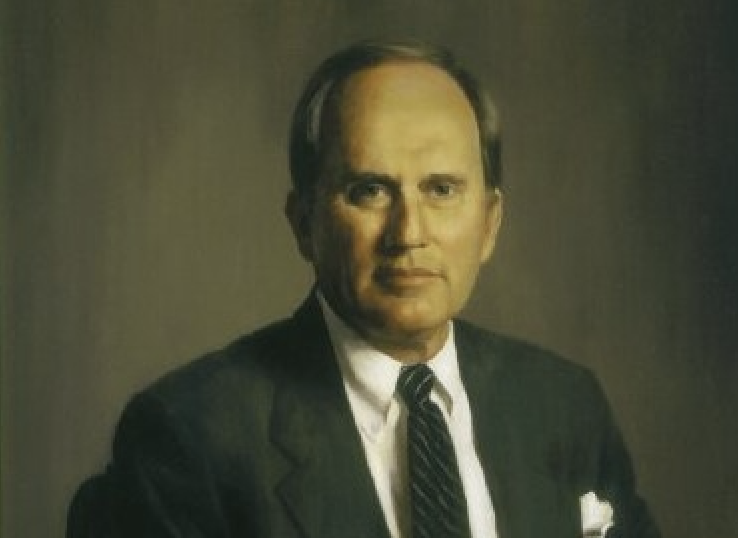This story has been updated as of Sept. 21, 2023.
Former Kentucky governor Brereton Jones died on Monday at age 84.
His death was announced on X, formerly known as Twitter, by Gov. Andy Beshear.
“I was sad to learn that former Governor and Lt. Gov. Brereton Jones has passed away,” Beshear wrote. “Gov. Jones was a dedicated leader and a distinguished thoroughbred owner who worked to strengthen Kentucky for our families. Please join Britainy and me in praying for Libby and his family.”
Jones’ family released a statement explaining the cause of death to be a “lengthy illness.”
“Our family has lost its hero, our leader, our beloved “Pop,” but our hearts are filled with immeasurable gratitude for both the precious time we shared and the incredible outpouring of love we’ve received in the wake of his passing. We are overwhelmed by your kindness. Thank you,” his wife, Libby, and children, Lucy and Bret, said.
Jones served as lieutenant governor from 1987-1991 and governor from 1991-1995. He was known for his contributions to healthcare, ethics and the horse industry, according to a statement released by the Kentucky House Democratic Caucus on Facebook.
“He was a staunch advocate for improving healthcare access for all citizens; he embraced needed ethics reforms for government; he was a vocal supporter of our signature horse industry and state parks; and he helped clear the way for future constitutional officers to serve two consecutive terms,” the statement said.
Jones’ political career began in his native state of West Virginia where he was elected to the House of Delegates as a Republican, according to the Associated Press.
Al Cross, director of the Institute for Rural Journalism and Community Issues at UK and lifelong political journalist, followed Jones throughout his career. Cross said Jones’ love for horses led him to Kentucky in the ‘70s.
“He had a horse when he was a kid, probably more than one,” Cross said. “People told him Lexington was the place where the best horses were, and he said that’s where he wanted to be.”
Jones moved to Midway, KY with his wife where he turned her family’s large estate into the horse farm Airdrie Stud. Cross said he became a successful entrepreneur in the thoroughbred business.
“He helped the industry,” Cross said. “He was the head of the Kentucky Equine Education Project that wound up advocating for the idea of historical horse racing as a way to continue Kentucky as the number one horse breeding state.”
Jones served on the University of Kentucky’s Board of Trustees from April of 1982 to November of 1987, according to university spokesperson Jay Blanton.
“Other trustees said that he was a sociative contributor. He was not one of these people who just wanted to be on the board so they could go to ball games and get good seats,” Cross said. “I am of the belief that he was a trustee because he wanted to advance the university.”
Jones became a Democrat and got involved in Kentucky’s political reform, according to Cross.
“He got into politics for the right reasons and left the state better than he found it,” Cross said.
“He was a reformer, and when people would question what he was doing or think he was being a hypocrite, he really took offense at that. He never quite adapted to being a politician.”
During his administration, Jones attempted to reform healthcare for the Commonwealth after a near-death experience. According to the Courier Journal, Jones was in a helicopter crash that hospitalized him and inspired him to release the following statement:
“I think the plan must be health care reform, and I am chomping at the bit to continue our work,” Jones said. “I hope every Kentuckians will soon have access to the same quality of care I am receiving.”
He envisioned a universal healthcare system, which ultimately failed but was not forgotten after his term ended, the Courier Journal reported.
Despite promoting a state constitutional amendment to allow Kentucky governors to serve two consecutive terms, according to the National Governors Association, Jones chose to exclude himself from the amendment and only serve one term.
“The fact that he was willing to exempt himself from that amendment made it more acceptable to the legislature and voters,” Cross said. “He said he simply wanted to serve one term as governor and go back to the farm and that’s what he did.”
Cross believes this decision was telling of Jones’ character.
“He was high minded, well motivated and had a great sense of personal morality. He was an easy guy to like,” Cross said. “He came across as being very genuine without much guile. That really helped him influence people.”
































































































































































